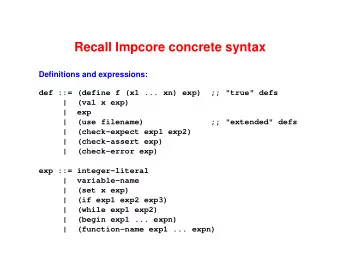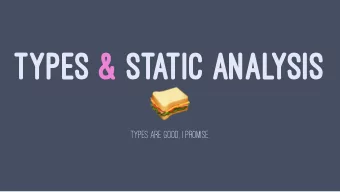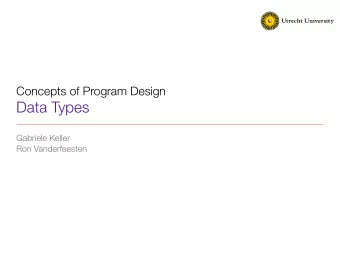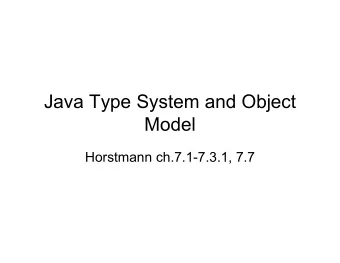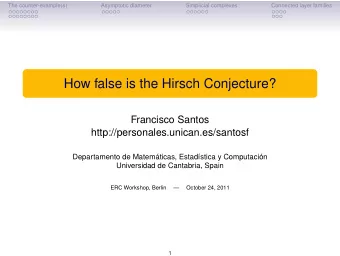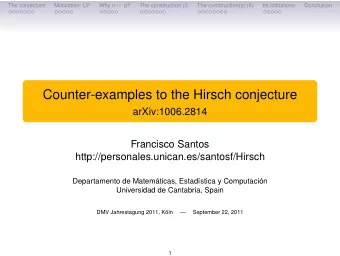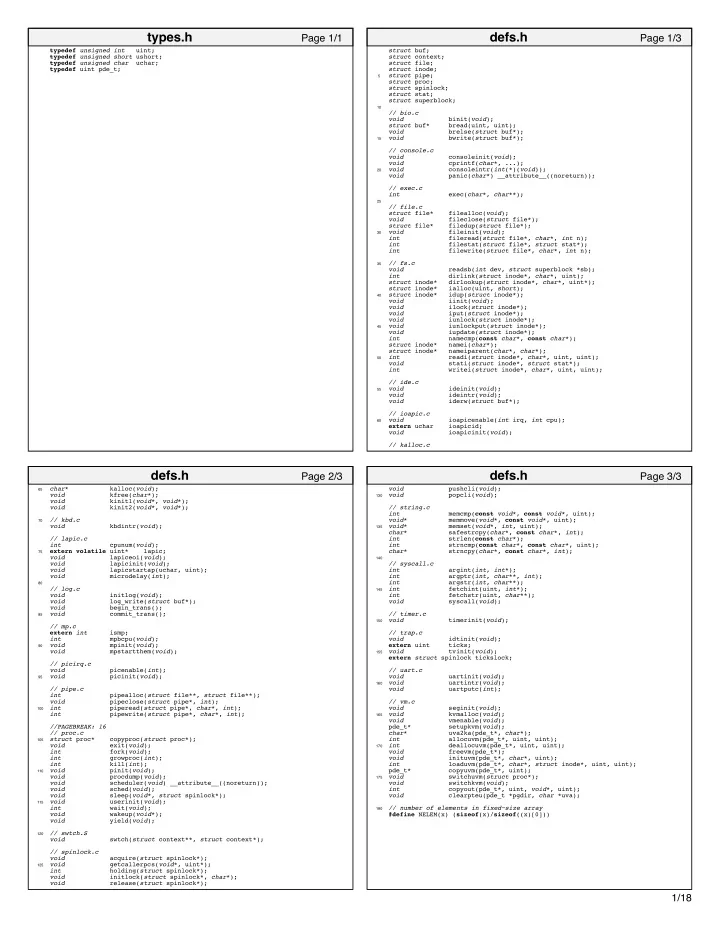
types.h defs.h Page 1/1 Page 1/3 typedef unsigned int uint; struct - PDF document
types.h defs.h Page 1/1 Page 1/3 typedef unsigned int uint; struct buf; typedef unsigned short ushort; struct context; typedef unsigned char uchar; struct file; typedef uint pde_t; struct inode; struct pipe; 5 struct proc; struct spinlock;
types.h defs.h Page 1/1 Page 1/3 typedef unsigned int uint; struct buf; typedef unsigned short ushort; struct context; typedef unsigned char uchar; struct file; typedef uint pde_t; struct inode; struct pipe; 5 struct proc; struct spinlock; struct stat; struct superblock; 10 // bio.c void binit( void ); struct buf* bread(uint, uint); void brelse( struct buf*); void bwrite( struct buf*); 15 // console.c void consoleinit( void ); void cprintf( char *, ...); void consoleintr( int (*)( void )); 20 void panic( char *) __attribute__((noreturn)); // exec.c int exec( char *, char **); 25 // file.c struct file* filealloc( void ); void fileclose( struct file*); struct file* filedup( struct file*); void fileinit( void ); 30 int fileread( struct file*, char *, int n); int filestat( struct file*, struct stat*); int filewrite( struct file*, char *, int n); // fs.c 35 void readsb( int dev, struct superblock *sb); int dirlink( struct inode*, char *, uint); struct inode* dirlookup( struct inode*, char *, uint*); struct inode* ialloc(uint, short ); struct inode* idup( struct inode*); 40 void iinit( void ); void ilock( struct inode*); void iput( struct inode*); void iunlock( struct inode*); void iunlockput( struct inode*); 45 void iupdate( struct inode*); int namecmp( const char *, const char *); struct inode* namei( char *); struct inode* nameiparent( char *, char *); int readi( struct inode*, char *, uint, uint); 50 void stati( struct inode*, struct stat*); int writei( struct inode*, char *, uint, uint); // ide.c void ideinit( void ); 55 void ideintr( void ); void iderw( struct buf*); // ioapic.c void ioapicenable( int irq, int cpu); 60 extern uchar ioapicid; void ioapicinit( void ); // kalloc.c defs.h defs.h Page 2/3 Page 3/3 char * kalloc( void ); void pushcli( void ); 65 void kfree( char *); void popcli( void ); 130 void kinit1( void *, void *); void kinit2( void *, void *); // string.c int memcmp( const void *, const void *, uint); // kbd.c void * memmove( void *, const void *, uint); 70 void kbdintr( void ); void * memset( void *, int , uint); 135 char * safestrcpy( char *, const char *, int ); // lapic.c int strlen( const char *); int cpunum( void ); int strncmp( const char *, const char *, uint); extern volatile uint* lapic; char * strncpy( char *, const char *, int ); 75 void lapiceoi( void ); 140 void lapicinit( void ); // syscall.c void lapicstartap(uchar, uint); int argint( int , int *); void microdelay( int ); int argptr( int , char **, int ); int argstr( int , char **); 80 // log.c int fetchint(uint, int *); 145 void initlog( void ); int fetchstr(uint, char **); void log_write( struct buf*); void syscall( void ); void begin_trans(); void commit_trans(); // timer.c 85 void timerinit( void ); 150 // mp.c extern int ismp; // trap.c int mpbcpu( void ); void idtinit( void ); void mpinit( void ); extern uint ticks; 90 void mpstartthem( void ); void tvinit( void ); 155 extern struct spinlock tickslock; // picirq.c void picenable( int ); // uart.c void picinit( void ); void uartinit( void ); 95 void uartintr( void ); 160 // pipe.c void uartputc( int ); int pipealloc( struct file**, struct file**); void pipeclose( struct pipe*, int ); // vm.c int piperead( struct pipe*, char *, int ); void seginit( void ); 100 int pipewrite( struct pipe*, char *, int ); void kvmalloc( void ); 165 void vmenable( void ); //PAGEBREAK: 16 pde_t* setupkvm( void ); // proc.c char * uva2ka(pde_t*, char *); struct proc* copyproc( struct proc*); int allocuvm(pde_t*, uint, uint); 105 void exit( void ); int deallocuvm(pde_t*, uint, uint); 170 int fork( void ); void freevm(pde_t*); int growproc( int ); void inituvm(pde_t*, char *, uint); int kill( int ); int loaduvm(pde_t*, char *, struct inode*, uint, uint); void pinit( void ); pde_t* copyuvm(pde_t*, uint); 110 void procdump( void ); void switchuvm( struct proc*); 175 void scheduler( void ) __attribute__((noreturn)); void switchkvm( void ); void sched( void ); int copyout(pde_t*, uint, void *, uint); void sleep( void *, struct spinlock*); void clearpteu(pde_t *pgdir, char *uva); void userinit( void ); 115 int wait( void ); // number of elements in fixed − size array 180 void wakeup( void *); #define NELEM(x) ( sizeof (x)/ sizeof ((x)[0])) void yield( void ); // swtch.S 120 void swtch( struct context**, struct context*); // spinlock.c void acquire( struct spinlock*); void getcallerpcs( void *, uint*); 125 int holding( struct spinlock*); void initlock( struct spinlock*, char *); void release( struct spinlock*); 1/18
param.h proc.h Page 1/1 Page 1/2 #define NPROC 64 // maximum number of processes // Segments in proc − >gdt. #define KSTACKSIZE 4096 // size of per − process kernel stack #define NSEGS 7 #define NCPU 8 // maximum number of CPUs #define NOFILE 16 // open files per process // Per − CPU state #define NFILE 100 // open files per system struct cpu { 5 5 #define NBUF 10 // size of disk block cache uchar id; // Local APIC ID; index into cpus[] below #define NINODE 50 // maximum number of active i − nodes struct context *scheduler; // swtch() here to enter scheduler #define NDEV 10 // maximum major device number struct taskstate ts; // Used by x86 to find stack for interrupt #define ROOTDEV 1 // device number of file system root disk struct segdesc gdt[NSEGS]; // x86 global descriptor table #define MAXARG 32 // max exec arguments volatile uint started; // Has the CPU started? 10 10 #define LOGSIZE 10 // max data sectors in on − disk log int ncli; // Depth of pushcli nesting. int intena; // Were interrupts enabled before pushcli? // Cpu − local storage variables; see below struct cpu *cpu; 15 struct proc *proc; // The currently − running process. }; extern struct cpu cpus[NCPU]; extern int ncpu; 20 // Per − CPU variables, holding pointers to the // current cpu and to the current process. // The asm suffix tells gcc to use "%gs:0" to refer to cpu // and "%gs:4" to refer to proc. seginit sets up the 25 // %gs segment register so that %gs refers to the memory // holding those two variables in the local cpu’s struct cpu. // This is similar to how thread − local variables are implemented // in thread libraries such as Linux pthreads. extern struct cpu *cpu asm ("%gs:0"); // &cpus[cpunum()] 30 extern struct proc *proc asm ("%gs:4"); // cpus[cpunum()].proc //PAGEBREAK: 17 // Saved registers for kernel context switches. // Don’t need to save all the segment registers (%cs, etc), 35 // because they are constant across kernel contexts. // Don’t need to save %eax, %ecx, %edx, because the // x86 convention is that the caller has saved them. // Contexts are stored at the bottom of the stack they // describe; the stack pointer is the address of the context. 40 // The layout of the context matches the layout of the stack in swtch.S // at the "Switch stacks" comment. Switch doesn’t save eip explicitly, // but it is on the stack and allocproc() manipulates it. struct context { uint edi; 45 uint esi; uint ebx; uint ebp; uint eip; }; 50 enum procstate { UNUSED, EMBRYO, SLEEPING, RUNNABLE, RUNNING, ZOMBIE }; // Per − process state struct proc { 55 uint sz; // Size of process memory (bytes) pde_t* pgdir; // Page table char *kstack; // Bottom of kernel stack for this process enum procstate state; // Process state volatile int pid; // Process ID 60 struct proc *parent; // Parent process struct trapframe *tf; // Trap frame for current syscall struct context *context; // swtch() here to run process void *chan; // If non − zero, sleeping on chan proc.h memlayout.h Page 2/2 Page 1/1 int killed; // If non − zero, have been killed // Memory layout 65 struct file *ofile[NOFILE]; // Open files struct inode *cwd; // Current directory #define EXTMEM 0x100000 // Start of extended memory char name[16]; // Process name (debugging) #define PHYSTOP 0xE000000 // Top physical memory }; #define DEVSPACE 0xFE000000 // Other devices are at high addresses 5 70 // Process memory is laid out contiguously, low addresses first: // Key addresses for address space layout (see kmap in vm.c for layout) // text #define KERNBASE 0x80000000 // First kernel virtual address // original data and bss #define KERNLINK (KERNBASE+EXTMEM) // Address where kernel is linked // fixed − size stack 10 // expandable heap #ifndef __ASSEMBLER__ 75 static inline uint v2p( void *a) { return ((uint) (a)) − KERNBASE; } static inline void *p2v(uint a) { return ( void *) ((a) + KERNBASE); } 15 #endif #define V2P(a) (((uint) (a)) − KERNBASE) #define P2V(a) ((( void *) (a)) + KERNBASE) 20 #define V2P_WO(x) ((x) − KERNBASE) // same as V2P, but without casts #define P2V_WO(x) ((x) + KERNBASE) // same as V2P, but without casts 2/18
Recommend
More recommend
Explore More Topics
Stay informed with curated content and fresh updates.


